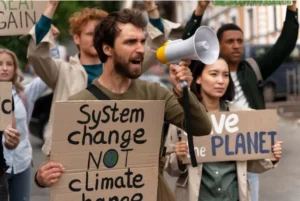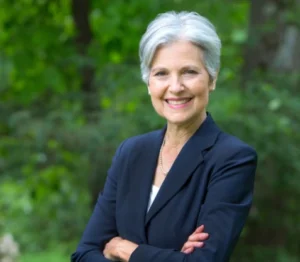Jill Stein is a prominent figure in American politics, known for her unwavering commitment to environmental issues, social justice, and healthcare reform. As a two-time presidential candidate for the Green Party, Stein has made significant contributions to the political landscape, advocating for policies that prioritize the well-being of people and the planet. This article delves into the life and career of Jill Stein, exploring her early years, medical career, entry into politics, and her enduring impact on American political discourse.
Early Life and Education
Jill Ellen Stein was born on May 14, 1950, in Chicago, Illinois. Raised in a middle-class Jewish family, Stein’s parents instilled in her the values of hard work, education, and social responsibility. She attended Harvard University, where she earned her undergraduate degree in 1973. Stein continued her education at Harvard Medical School, graduating in 1979 with a Doctor of Medicine degree.
Growing up in a politically aware household, Stein was exposed to discussions about social justice and environmental issues from a young age. This early exposure played a significant role in shaping her future activism and political career. Her academic journey at Harvard further solidified her commitment to addressing the root causes of health and environmental problems.
Medical Career
Before entering the political arena, Jill Stein had a successful career as a physician. She practiced internal medicine for over 25 years, focusing on the health impacts of environmental factors. Stein’s medical background provided her with a unique perspective on public health issues, particularly the links between environmental degradation and human health. Her work as a physician laid the foundation for her later activism and political endeavors.
During her medical career, Stein became increasingly concerned about the impact of pollution and toxic chemicals on public health. She authored several reports and articles on the subject, highlighting the need for stronger environmental regulations to protect human health. Her advocacy in this area earned her recognition and respect within the medical community and beyond.
Stein’s medical career also included teaching roles at Harvard Medical School and other institutions, where she educated future healthcare professionals about the importance of environmental health. Her dedication to public health extended to her involvement in various professional organizations, where she worked to promote policies that would improve health outcomes for all.
Entry into Politics
Jill Stein’s political career began in the early 2000s, driven by her growing concern over environmental issues and the influence of corporate money in politics. She became involved with the Massachusetts Coalition for Healthy Communities, advocating for clean energy, sustainable agriculture, and healthcare reform. Stein’s activism led her to the Green Party, where she found a platform that aligned with her values and vision for a more equitable and sustainable society.
Stein’s entry into politics was marked by her commitment to grassroots organizing and community engagement. She believed that real change could only come from the bottom up, and she worked tirelessly to build coalitions and mobilize support for progressive causes. Her efforts paid off, as she quickly became a leading voice within the Green Party and a respected advocate for environmental and social justice.
2002 Massachusetts Gubernatorial Campaign
In 2002, Jill Stein made her first foray into electoral politics by running for governor of Massachusetts as the Green-Rainbow Party candidate. Although she did not win, her campaign brought attention to critical issues such as environmental protection, healthcare access, and campaign finance reform. Stein’s gubernatorial run marked the beginning of her long-term commitment to challenging the status quo and promoting progressive policies.
During her gubernatorial campaign, Stein emphasized the need for a comprehensive approach to addressing environmental and social issues. She called for investments in renewable energy, improvements in public transportation, and the creation of green jobs. Her platform resonated with many voters who were frustrated with the lack of action on these issues from the major parties.
Stein’s campaign also highlighted the importance of campaign finance reform, as she refused to accept corporate donations and relied on grassroots support. This approach set the tone for her future political endeavors and underscored her commitment to reducing the influence of money in politics.
2012 Presidential Campaign
Jill Stein’s first presidential campaign in 2012 was a significant milestone in her political career. Running as the Green Party’s nominee, Stein’s platform focused on the “Green New Deal,” a comprehensive plan to address climate change, create jobs, and reduce economic inequality. Although she received only a small percentage of the vote, Stein’s campaign resonated with many voters who were disillusioned with the two-party system and seeking an alternative.
Stein’s 2012 campaign was notable for its emphasis on grassroots organizing and its rejection of corporate donations. She traveled across the country, meeting with community leaders, activists, and ordinary citizens to build support for her platform. Her message of systemic change and her commitment to environmental and social justice struck a chord with many voters, particularly young people and progressives.
The 2012 campaign also saw Stein advocating for a range of progressive policies, including student debt forgiveness, universal healthcare, and a living wage. Her platform was designed to address the root causes of economic and social inequality, and she called for bold action to create a more just and sustainable society.
2016 Presidential Campaign
Stein’s 2016 presidential campaign further solidified her position as a leading voice in progressive politics. Once again running on the Green Party ticket, she emphasized the need for systemic change to address the interconnected crises of climate change, economic inequality, and social injustice. Stein’s campaign gained more visibility and support than her previous run, reflecting a growing appetite for bold, transformative policies.
The 2016 campaign was marked by Stein’s participation in several high-profile debates and her efforts to build a broad-based coalition of supporters. She called for an end to the influence of corporate money in politics, the implementation of a single-payer healthcare system, and a transition to 100% renewable energy. Her platform also included proposals for criminal justice reform, student debt relief, and a living wage.
Stein’s 2016 campaign also focused on foreign policy issues, where she advocated for a more peaceful and cooperative approach to international relations. She called for an end to U.S. military interventions abroad and a reduction in military spending, arguing that resources should be redirected towards domestic needs such as education, healthcare, and infrastructure.
Key Issues and Policy Positions
Throughout her political career, Jill Stein has been a staunch advocate for several key issues:
Environmental Protection
Stein’s commitment to environmental protection is a cornerstone of her political platform. She has consistently called for a transition to 100% renewable energy, the phasing out of fossil fuels, and the implementation of sustainable agricultural practices. Stein’s “Green New Deal” proposal aims to create millions of green jobs while addressing the urgent threat of climate change.
Stein’s environmental policies are rooted in her belief that the health of the planet and the health of its inhabitants are inextricably linked. She has called for a ban on fracking, the closure of nuclear power plants, and the implementation of strict regulations on industrial pollution. Her vision for a sustainable future includes investments in public transportation, energy efficiency, and conservation.
Stein has also been a vocal advocate for environmental justice, highlighting the disproportionate impact of environmental degradation on low-income communities and communities of color. She has called for policies that address these disparities and ensure that all people have access to clean air, water, and a healthy environment.
Healthcare Reform
As a physician, Jill Stein has a deep understanding of the healthcare system and its shortcomings. She advocates for a single-payer, Medicare-for-All system that would provide comprehensive healthcare coverage to all Americans. Stein believes that healthcare is a human right and that a publicly funded system is the most effective way to ensure equitable access to medical services.
Stein’s healthcare platform includes proposals for expanding access to mental health services, reducing the cost of prescription drugs, and addressing the social determinants of health. She has also called for investments in preventive care and public health initiatives to reduce the burden of chronic diseases and improve overall health outcomes.
Stein’s commitment to healthcare reform is driven by her experiences as a physician, where she witnessed firsthand the barriers that many people face in accessing quality care. She has been a vocal critic of the for-profit healthcare system and has called for a shift towards a more equitable and sustainable model.
Economic Justice
Stein’s economic policies focus on reducing inequality and creating a fairer economy. She supports raising the minimum wage, implementing progressive taxation, and investing in public infrastructure and education. Stein’s vision for economic justice includes breaking up large financial institutions and promoting worker-owned cooperatives.
Stein has been a vocal critic of corporate welfare and the influence of money in politics. She has called for an end to tax breaks and subsidies for large corporations and the implementation of policies to support small businesses and local economies. Her economic platform also includes proposals for affordable housing, paid family leave, and universal basic income.
Stein’s economic policies are designed to address the root causes of inequality and create a more just and sustainable economy. She has called for a shift towards a more democratic and participatory economic system, where workers have a greater say in the decisions that affect their lives.
Social Justice
Jill Stein is a vocal proponent of social justice, advocating for policies that address systemic racism, gender inequality, and LGBTQ+ rights. She supports criminal justice reform, including the decriminalization of marijuana, ending mass incarceration, and addressing police brutality. Stein’s commitment to social justice extends to her support for immigrant rights and opposition to discriminatory policies.
Stein’s social justice platform includes proposals for comprehensive immigration reform, protections for workers’ rights, and investments in education and job training programs. She has also called for an end to the school-to-prison pipeline and the implementation of restorative justice practices in schools and communities.
Stein’s commitment to social justice is driven by her belief that all people deserve to live with dignity and respect. She has been a vocal advocate for policies that address the root causes of inequality and create a more just and inclusive society.
Foreign Policy
Stein’s foreign policy positions emphasize diplomacy, peace, and cooperation. She has been a vocal critic of U.S. military interventions and has called for a significant reduction in military spending. Stein advocates for redirecting resources towards domestic needs, such as education, healthcare, and infrastructure.
Stein’s foreign policy platform includes proposals for ending arms sales to repressive regimes, closing overseas military bases, and promoting international cooperation on issues such as climate change and human rights. She has called for a shift towards a more peaceful and cooperative approach to international relations, where diplomacy and dialogue are prioritized over military action.
Education Reform

Stein’s education policies focus on ensuring that all students have access to high-quality education, regardless of their background or socioeconomic status. She supports increasing funding for public schools, reducing class sizes, and providing free higher education. Stein believes that education is a fundamental right and that investments in education are essential for building a more just and equitable society.
Stein’s education platform includes proposals for eliminating student debt, expanding access to early childhood education, and increasing support for teachers and school staff. She has called for a shift towards a more holistic and inclusive approach to education, where all students are given the opportunity to succeed.
Criticisms and Controversies
Like many public figures, Jill Stein has faced her share of criticisms and controversies. Some critics argue that her campaigns have drawn votes away from Democratic candidates, potentially influencing election outcomes. Stein has also faced scrutiny for her stance on certain issues, such as vaccine safety and her interactions with foreign leaders. Despite these challenges, Stein remains a steadfast advocate for her principles and continues to engage in political activism.
Stein’s critics have also raised concerns about her positions on foreign policy and her involvement in the recount efforts following the 2016 election. Despite these controversies, Stein has remained committed to her vision of a more just and sustainable world and continues to advocate for progressive policies.
Stein has addressed these criticisms by emphasizing the importance of building a broad-based movement for change. She has called for greater unity among progressives and has worked to build coalitions with other activists and organizations. Her commitment to her principles and her willingness to engage with her critics have earned her respect and admiration from many supporters.
Legacy and Impact

Jill Stein’s legacy in American politics is characterized by her unwavering commitment to environmental sustainability, social justice, and healthcare reform. While she has not held elected office, her campaigns have brought important issues to the forefront of political discourse and inspired a new generation of activists. Stein’s influence extends beyond her electoral efforts, as she continues to advocate for progressive policies and challenge the status quo.
Stein’s impact can be seen in the growing support for policies such as the Green New Deal, Medicare-for-All, and criminal justice reform. Her work has helped to shift the political conversation and build momentum for progressive change. As the challenges of climate change, economic inequality, and social injustice persist, Jill Stein’s vision for a better future remains as relevant as ever.
Stein’s legacy also includes her contributions to the Green Party and the broader progressive movement. She has worked to build a more inclusive and democratic political system, where all voices are heard and all people have a say in the decisions that affect their lives. Her commitment to grassroots organizing and community engagement has inspired countless individuals to get involved in the fight for a more just and sustainable world.
Stein’s influence can also be seen in the growing number of progressive candidates and activists who have been inspired by her work. Her campaigns have helped to build a more vibrant and diverse progressive movement, where new voices and ideas are welcomed and celebrated.
Opinion
Jill Stein’s journey from physician to political activist and presidential candidate is a testament to her dedication to creating a more just and sustainable world. Her work with the Green Party and her advocacy for bold, transformative policies have left an indelible mark on American politics. As the challenges of climate change, economic inequality, and social injustice persist, Jill Stein’s vision for a better future remains as relevant as ever.
Stein’s commitment to environmental protection, healthcare reform, economic justice, and social justice has inspired countless individuals to join the fight for a more equitable and sustainable society. Her legacy serves as a reminder that real change is possible when people come together to demand a better future. As we continue to face the pressing issues of our time, Jill Stein’s example provides a powerful model for how to build a more just and sustainable world.
Stein’s work has also highlighted the importance of building a broad-based movement for change. She has called for greater unity among progressives and has worked to build coalitions with other activists and organizations. Her commitment to her principles and her willingness to engage with her critics have earned her respect and admiration from many supporters.
Conclusion
Jill Stein’s life and career are a testament to the power of grassroots organizing and the importance of fighting for a more just and sustainable world. Her legacy will continue to inspire future generations of activists and leaders, as we work together to build a better future for all.
Stein’s influence extends beyond her electoral efforts, as she continues to advocate for progressive policies and challenge the status quo. Her work has helped to shift the political conversation and build momentum for progressive change. As the challenges of climate change, economic inequality, and social injustice persist, Jill Stein’s vision for a better future remains as relevant as ever.
Stein’s commitment to environmental protection, healthcare reform, economic justice, and social justice has inspired countless individuals to join the fight for a more equitable and sustainable society. Her legacy serves as a reminder that real change is possible when people come together to demand a better future. As we continue to face the pressing issues of our time, Jill Stein’s example provides a powerful model for how to build a more just and sustainable world.
Stein’s work has also highlighted the importance of building a broad-based movement for change. She has called for greater unity among progressives and has worked to build coalitions with other activists and organizations. Her commitment to her principles and her willingness to engage with her critics have earned her respect and admiration from many supporters.

